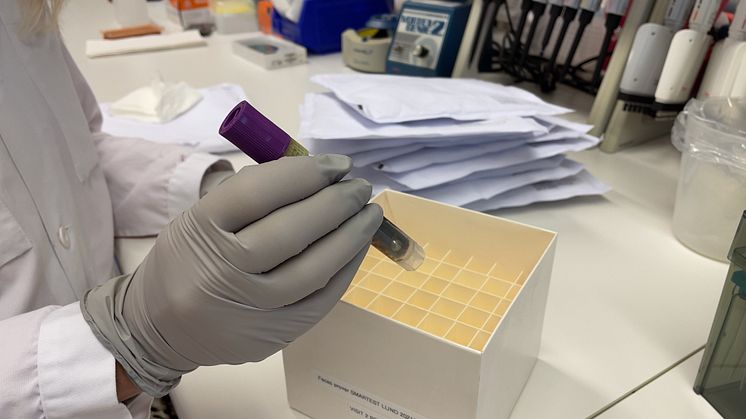Press release -
Strong link between gut bacteria and metabolites
There are strong links between bacteria living in the gut and the levels of small molecules in the blood known as metabolites. Such is the finding of a new study led by researchers from Uppsala University and Lund University, which is now published in the journal Nature Communications.
A team of scientists coordinated by Uppsala University and Lund University has found strong links between certain bacteria living in the gut and small molecules found in the blood. The study is based on analyses of both fecal and blood samples from 8,583 participants in the Swedish CArdioPulmonary bioImage Study (SCAPIS). The findings have now been published for the first time in Nature Communications, and have further been made freely available to the research community through an online atlas. The aim of the project was to contribute to the expanding knowledge base concerning how gut microbiota influence human health.
“Earlier studies have shown that the large bacterial community in our digestive system produce a variety of molecules, with the potential to enter the bloodstream and to impact our health. Conversely, medication or dietary components may affect the microbiota composition before entering the circulation. Characterisation of these interactions is an important step towards understanding the effects of the gut microbiota on health,” says Tove Fall, Professor of Molecular Epidemiology at the Department of Medical Sciences and the Science for Life Laboratory, Uppsala University, who coordinated the study together with researchers from Lund University.
Recent technological advances have enabled large-scale deep characterisation of bacterial communities in biological samples. This is done by sequencing the DNA content of the samples and comparing the results to DNA sequences from known bacteria. Advances in chemistry have further enabled large simultaneous screens of blood samples in order to measure small molecules. The SCAPIS study represents one of the largest collections in the world of both of these kinds of data. In this study scientists investigated the links between the gut microbiota and the small molecules in the blood.
“The gut microbiota is a universe of its own and we have just started to understand how the human host and the bacterial community affect each other. Our results show that for certain blood metabolites, the bacteria you carry in the gut constitute a strong determinant,” notes Marju Orho-Melander, Professor of Genetic Epidemiology, Lund University, and one of the senior authors of the study.
The scientific team believes that the breadth of findings may spur the interest of other international groups focusing on gut microbiota and host interactions, and has therefore opted to publish all the associations on a public website hosted by SciLife Data Centre in Uppsala (https://gutsyatlas.serve.scilifelab.se).
“The large number of samples containing high quality data allowed us to identify many novel associations. We have therefore chosen to publish all of our findings in an online open resource for the research community to use for their varying needs,” says Koen Dekkers, lead author from Uppsala University.
Publication: Koen F. Dekkers et al.; An online atlas of human plasma metabolite signatures of gut microbiome composition; Nature Communications. In press, DOI: 10.1038/s41467-022-33050-0, https://www.nature.com/articles/s41467-022-33050-0.
For further information, contact:
Tove Fall, Professor of Molecular Epidemiology, Department of Medical Sciences, Molecular Epidemiology, and the Science for Life Laboratory, Uppsala University, Mobile: +46 (0)70-221 58 59, email: tove.fall@medsci.uu.se
Marju Orho-Melander, Professor of Genetic Epidemiology, Lund University Diabetes Centre (LUDC), Department of Clinical Sciences in Malmö, Lund University, Mobile: +46 (0)70-739 82 89, email: marju.orho-melander@med.lu.se
Facts about SCAPIS: The SCAPIS (Swedish CArdioPulmonary bioImage Study) research programme is a population study involving extensive measurements of 30,000 Swedes aged 50–64. The aim of the project is to find risk markers that allow prediction of who is at risk of cardiopulmonary disease, and prevention of this disease before it occurs. The study is a collaboration among six university hospitals in Sweden, funded primarily by the Swedish Heart-Lung Foundation.
Funding: The main funding body of the Swedish CArdioPulmonary bioImage Study (SCAPIS) is the Swedish Heart-Lung Foundation. SCAPIS is also funded by the Knut and Alice Wallenberg Foundation; the Swedish Research Council, and VINNOVA (Sweden’s Innovation agency); the University of Gothenburg and Sahlgrenska University Hospital; Karolinska Institutet and Stockholm county council; Linköping University and University Hospital; Lund University and Skåne University Hospital; Umeå University and University Hospital; and Uppsala University and University Hospital. Financial support for this project was provided by the European Research Council, the Swedish Research Council, the Swedish Heart-Lung Foundation, the Göran Gustafsson foundation, Axel and Signe Lagerman’s foundation, the A.L.F. governmental grant, the Novo Nordisk Foundation, the Swedish Diabetes foundation the Swedish Foundation for Strategic Research and Formas.
Topics
Categories
Uppsala University
The first University in Sweden. Quality, knowledge, and creativity since 1477. Education and research of the highest quality and relevance to society, business, and culture. Uppsala University is ranked among the world’s top higher education institutions. www.uu.se



